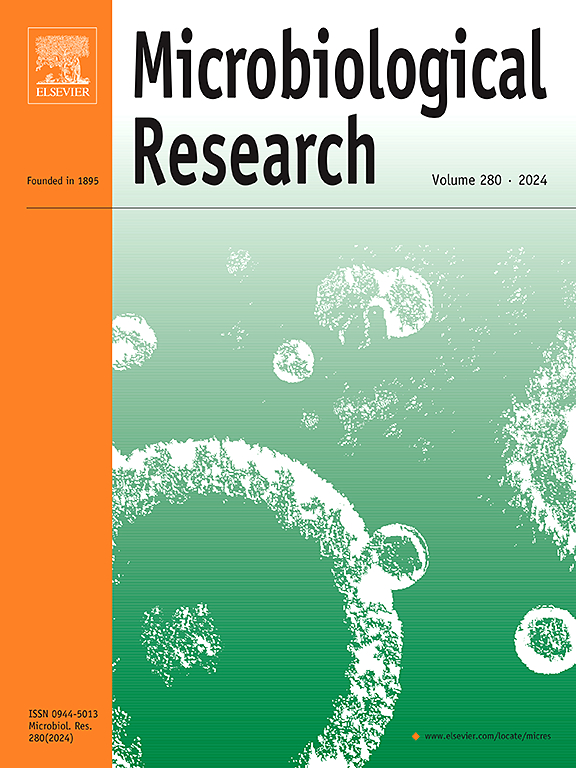The relationship between tryptophan metabolism and gut microbiota: Interaction mechanism and potential effects in infection treatment
IF 6.1
1区 生物学
Q1 MICROBIOLOGY
引用次数: 0
Abstract
Human health is influenced by the gut microbiota, particularly in aspects of host immune homeostasis and intestinal immune response. Tryptophan (Trp) not only acts as a nutrient enhancer but also plays a critical role in the balance between host immune tolerance and gut microbiota maintenance. Both endogenous and bacterial metabolites of Trp, exert significant effects on gut microbial composition, microbial metabolism, the host immunity and the host-microbiome interface.
Trp metabolites regulate host immunity by activating aryl hydrocarbon receptor (AhR), thereby contributing to immune homeostasis. Among Trp metabolites, AhR ligands include endogenous metabolites (such as kynurenine), and bacterial metabolites (such as indole and its derivatives). Here, we present a comprehensive analysis of the relationships between Trp metabolism and 14 key microbiota, encompassing fungi (e.g., Candida albicans, Aspergillus), bacteria (e.g., Ruminococcus gnavus, Bacteroides, Prevotella copri, Clostridium difficile, Escherichia coli, lactobacilli, Mycobacterium tuberculosis, Pseudomonas aeruginosa, Staphylococcus aureus, Helicobacter. Pylori), and viruses (e.g., SARS-CoV-2, influenza virus). This review clarifies how the gut microbiota regulates Trp metabolism and uncovers the underlying mechanisms of these interactions. And increased mechanistic insight into how the microbiota modulate the host immune system through Trp metabolism may allow for the identification of innovative therapies that are specifically designed to target Trp absorption, Trp metabolites, the gut microbiota, or interactions between Trp and gut microbiota to treat both intestinal and extra-intestinal inflammation as well as microbial infections.
色氨酸代谢与肠道菌群的关系:相互作用机制及其在感染治疗中的潜在作用
人体健康受到肠道菌群的影响,特别是在宿主免疫稳态和肠道免疫反应方面。色氨酸(Trp)不仅作为营养增强剂,而且在宿主免疫耐受和肠道菌群维持之间的平衡中起着至关重要的作用。色氨酸的内源性代谢产物和细菌代谢产物对肠道微生物组成、微生物代谢、宿主免疫和宿主-微生物界面均有显著影响。色氨酸代谢物通过激活芳烃受体(aryl hydrocarbon receptor, AhR)来调节宿主免疫,从而促进免疫稳态。在色氨酸代谢物中,AhR配体包括内源性代谢物(如犬尿氨酸)和细菌代谢物(如吲哚及其衍生物)。在这里,我们全面分析了色氨酸代谢与14个关键微生物群之间的关系,包括真菌(如白色念珠菌、曲霉)、细菌(如gninococcus gnavus、Bacteroides、Prevotella copri、Clostridium difficile、大肠杆菌、乳酸菌、结核分枝杆菌、铜绿假单胞菌、金黄色葡萄球菌、幽门螺杆菌)。幽门螺杆菌)和病毒(如SARS-CoV-2、流感病毒)。这篇综述阐明了肠道微生物群如何调节色氨酸代谢,并揭示了这些相互作用的潜在机制。对微生物群如何通过色氨酸代谢调节宿主免疫系统机制的深入了解,可能有助于确定专门针对色氨酸吸收、色氨酸代谢物、肠道微生物群或色氨酸与肠道微生物群之间相互作用的创新疗法,以治疗肠道和肠外炎症以及微生物感染。
本文章由计算机程序翻译,如有差异,请以英文原文为准。
求助全文
约1分钟内获得全文
求助全文
来源期刊

Microbiological research
生物-微生物学
CiteScore
10.90
自引率
6.00%
发文量
249
审稿时长
29 days
期刊介绍:
Microbiological Research is devoted to publishing reports on prokaryotic and eukaryotic microorganisms such as yeasts, fungi, bacteria, archaea, and protozoa. Research on interactions between pathogenic microorganisms and their environment or hosts are also covered.
 求助内容:
求助内容: 应助结果提醒方式:
应助结果提醒方式:


